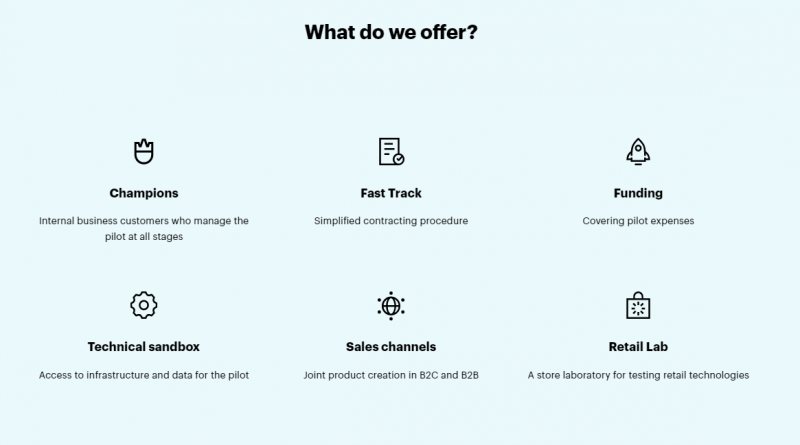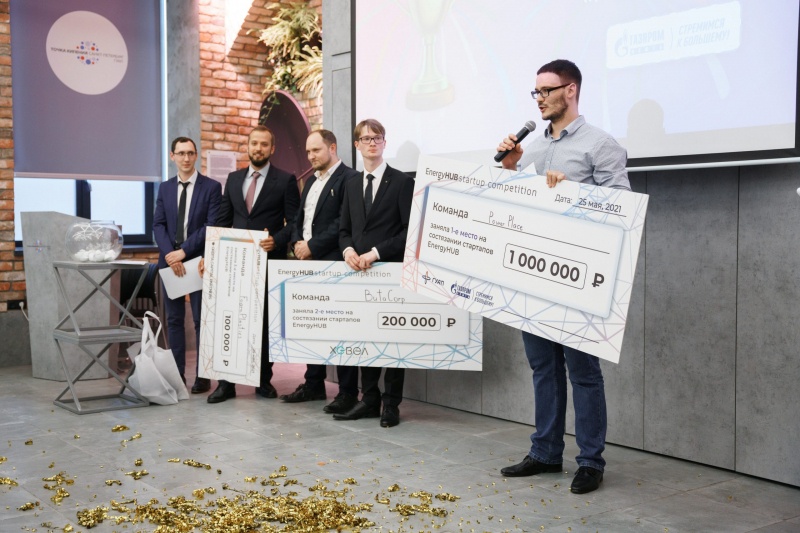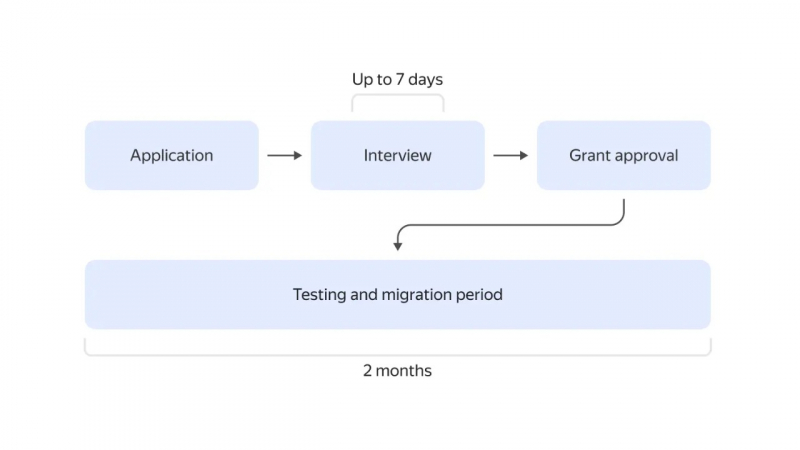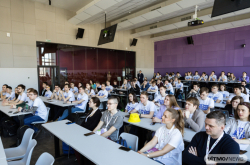Pitch a business idea and get support from entrepreneurs
Kaspersky Product Studio welcomes students with ideas for novel B2B (business-to-business) products in cybersecurity or B2C (business-to-consumer) projects, which create or enrich user experience (e.g. replace an analog tool with a digital one). As explained by Elizaveta Kalenchuk, the company’s innovation ecosystem manager, the program is open to early stages projects in nearly all technological fields, be it a blockchain, financial technologies, solutions for lawyers and their clients, data storage systems, medical devices, digital communications, or messaging services. What’s important is that a startup team or leader, in case of a one-person business, could easily integrate into the company and know which product they want to develop, what it will do, and which tasks it will solve. Expertise in creating and launching startups is desirable, but not mandatory.
In case the company has approved the idea, they will take several months to validate hypotheses and, if substantiated, the startup will be offered a resident position. The representatives will also invite the entire team to join Kaspersky Lab’s staff, help in finding wanted specialists, provide financing and back-office support (incl. lawyers, HR specialists, accountants, etc.), and access to the company’s communities and partners. Together, they will build an MVP (minimum viable product) and a product prototype, which will later be scaled up. In return, Kaspersky Product Studio will ask for a share in the startup if it achieves the stated metrics within three years. Among the lab’s business incubator graduates are, for instance, the Kaspersky Antidrone (a system to counter drones at facilities of any size) or Polys (an online voting platform based on blockchain technology) projects.
Those who are working on B2B or B2C projects related to telecommunications, mobile apps and infrastructure, marketing technologies, user experience, retail and online stores, should consider joining MegaFon Sandbox. According to Kirill Seredenko, a product analyst at MegaFon, a startup tracker, and a mentor at ITMO, the program is aimed at C+ projects, meaning that teams should not only propose a clear and measurable hypothesis, a required expertise, and an MVP but also have their first sales and even, preferably, corporate work experience. The startup teams are also expected to show interest in partnership with the company. Pilot projects will be implemented within 90 days under the proposed program budget.

What MegaFon Sandbox can offer. Credit: sandbox.megafon.ru/en
The process is split into several phases:
Scouting and structuring the pilot: within 30 days after the request is received, the company has to study the request, run a funnel analysis, and contact counterparts.
Pilot launch: in the next 90 days, the company starts the piloting process, which is assisted by Champions, internal business customers who manage the pilot at all stages, and may include the following steps: Fast Track (a simplified contracting procedure) and iBoard (project approval by a top manager). During this stage, the entrepreneurs are offered not only financial and expert support but also access to the company’s infrastructure, sales channels, and a store laboratory for testing technologies.
Further actions: after the pilot is launched, MegaFon has to decide on a transaction type, be it a licensing or M&A (mergers & acquisitions) model. The Sandbox’s successful projects include a virtual assistant called Eva developed jointly with the Just AI company and meant to stop spam calls.
How companies support youth entrepreneurship
In 2020, Gazprom Neft opened five student communities at St. Petersburg’s major engineering university, including ITMO University, to support students’ technological initiatives in the energy sector. The company in partnership with the universities and its technological partners holds a series of annual events, which are meant to help students to launch their startups and reach new professional heights.
In October, students can attend fairs to learn about current technological challenges in the energy industry from business representatives. Then, from November to April, the EnergyLab welcomes teams to develop projects under the guidance of mentors and trackers. In December, the lab’s participants may present their ideas at Generator Pitch Battle. The author of the best pitch will receive one million rubles and assistance from Gazprom Neft on the matters associated with expert support, financing, investments, and registration.

Alexey Kryzhanovsky (right), a co-founder of the Powerplace startup, and other winners of the first season of EnergyHUB. Credit: spbenergy.club/energylab
On top of that, students can take part in the energy conference St. PeteEnergY in March and compete for a one million prize at EnergyHUB in May. The winners of last year’s contest became the Powerplace team that developed a smart module for use in quick-charge stations for electric cars. The three other startups attracted over 10 million rubles in funding.
As stated by Kseniya Oparovskaya, the head of direction at Gazprom Neft’s Department of Technological Partnerships and Import Substitution, the company had to switch its focus from green energy to import substitution this year. Its experts pay particular attention to teams’ independence and motivation, as well as their prospects on the modern market, when selecting projects for their programs.
Foundations and programs for digital products
Dmitry Cherkashin, the head of Skolkovo Foundation’s Regional Development Department, believes that the company has a lot to offer to today’s high-tech startups in various fields, including financial and telecommunication technologies, oil and gas extraction, artificial intelligence, sensors, pharmacology, and more. Its residents can assess a wide range of the foundation’s services, among which are monetary support (grants, tax and customs exemptions, and the reimbursement of investments by business angels), guidance on commercialization and entering a global market, accelerator and mentorship program, and so on.
There are several requirements that students should meet to start a foundation programme. To begin with, their projects should include applied and exploratory research, as well as experimental advances or scientific and technological activities with a potential for future commercialization. Participants should be approved during a preliminary examination and possess legal personality, which, however, they can also obtain after becoming residents.
How to become a resident:
-
Set up a personal account and fill out an application form on the official website;
-
If properly completed, the application will be sent to experts who will review the proposed candidates’ commercial potential, competitive advantages, feasibility of their project, and competencies;
-
Once the prospective participant gets an approval, they receive the status of the Skolkovo participant. To accelerate the onboarding process, participants can make use of the paid Fast Track program. After candidates complete their application, they are to develop their projects together with their mentors, present it to the experts, acquire the status of legal entity, and become one of the Skolkovo’s residents within 10 days.
Yandex Cloud Boost offers assistance to companies specialized in digital products, namely, online services, platforms, aggregators, or video games. The platform helps aspiring entrepreneurs with problems that every young specialist faces when starting a business. This is the lack of innovative technologies, inability to scale up, infrastructure costs, and so on. Yandex Cloud Boost offers its participants a grant of up to 400,000 rubles over the period of 6 months, technological support, which includes architect consultations and training, Yandex B2B services at special rates, and promotion for the best participants (joint PR, community, and events).

The timeline from an application to grant. Credit: cloud.yandex.ru/cloud-boost
The head of Yandex Cloud’s startup community Ekaterina Luchaninova notes that the program is designed for companies and entrepreneurs who work on MVP-stage digital products and are not clients of the company. To sign up for the program, prospective participants have to fill out an application form on the website, after which they will receive an interview invitation. Once the startup gets a grant, it will be tested on the Yandex Cloud platform and then migrate into the platform within 6 months.
Since its launch three years ago, Yandex.Cloud has successfully implemented several projects in partnerships with different organizations. For instance, the platform gave a start to a monitoring and yield forecasting system for mass-production gardens operating under the aegis of the Botanical Gardens of Moscow State University. Jointly with Bauman Racing Team, the company built and trained a neural network for a self-driving car. As stressed by Evgeny Mikhaylenko, the company’s manager on work with higher education institutions, Yandex.Cloud has a multitude of services but the company’s specialists do not always know how they can be applied to solve everyday tasks. The fresh perspectives of newcomers may help the company find new and unconventional applications to what they already have on their hand.
The call for applications for ITMO Accelerator is open till April 30. This is an excellent opportunity for ITMO students to meet the university’s major industrial partners like MegaFon and Yandex.Cloud, as well as acquire expert and financial support for their technological startups or creative industry projects (smart cities, artificial intelligence, computer security, VR and AR, etc.).
The full steaming of the meeting can be found here.





